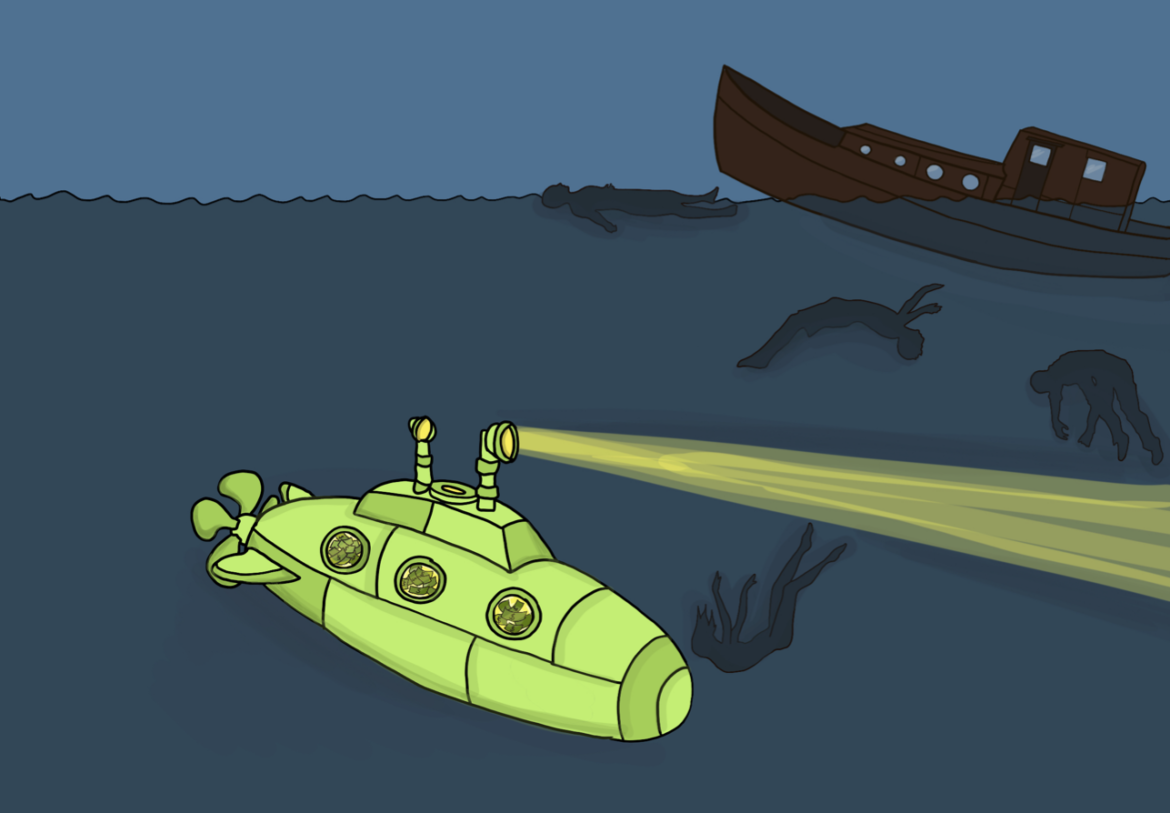Over the past three weeks, the international news topic that has dominated discussions among my peers has been the Titan submarine. “Did you hear it was rumoured they knew about an issue before going down”? “The leaked CEO’s emails disclosed that any concerns about the Titan’s safety mechanisms were dismissed”! It’s not that I am unsympathetic to their cause– it is a tragedy when lives are lost through passionate dreams– but I am more bothered by the unnerving sense that rises as I observe the disproportionate amount of media coverage given to ongoing and emerging humanitarian crises amid the Titan event.
For background, the Titan submarine launch set to explore the Titanic wreckage was operated through OceanGate Expeditions. This private Washington-based company offers underwater tourism for those willing to fork out the thousands required to fund these types of activities. The 250,000 dollar expedition carried millionaires Stockton Rush, Hamish Harding, Shahzada Dawood, Suleman Dawood, and former French Naval Diver Paul-Henry Nargeolet, diving 12,500 feet below the surface of eastern Canada’s waters, in Newfoundland, with the hopes of exploring the site of the Titanic’s historic shipwreck. In what was intended to be a two-hour-long descent at just the beginning of the expedition, the Titan lost contact with above-water operations after one hour and forty-five minutes underwater. As international criticism of OceanGate continues, similar expeditions have recently been suspended indefinitely.
While the world has been captured by the unfolding story of the missing millionaire-funded submarine, another crisis has simultaneously materialized; this time, a ship headed for Italy which sank circa June 14th, 2023. Originating from Libya, the catastrophic mission carried political refugees from Palestine, Pakistan, Syria, and Egypt, all of whom took this arduous journey with dreams of finding a safer place to call home. Mediterranean waters off the coast of Greece near Kalamata claimed an estimated 500 lives of men, women, and children, in what the International Organization for Migration declared as “one of the worst sea tragedies of the decade”. At their departure time, the migrant ship lacked proper personal flotation devices and ample room for all 750 passengers on board. For those lucky enough to survive the wreck, the trauma of losing loved ones and fighting for their lives in the Peloponnese polynesia has left irreparable psychological damage and familial separation. Nine Egyptian nationals have been arrested in their suspected connection to the planning of the illegal voyage.
Unfortunately, it is easy to guess which story has best drawn the attention of Western media outlets.
Other than stating the obvious, both headlines share the tragic tale of two parties choosing to set to sea with a dream in mind. Aside from this, one could not further separate the two in terms of the differences in privilege, inequality, and situation that led to their fatal incidents.
The greater focus on the Titan’s journey perfectly exemplifies the capitalist media bias that is so persistent in shaping the international perspectives on humanitarian crises and events that require humility, grace, and empathy. This notion of journalistic coverage favouring headlines focusing on flashier, more palatable, trendy even— stories is not unfamiliar. It plays out in our infatuation with celebrities, the obsession with “nowist” culture coined by psychologist Zygmunt Bauman, and ultimately, the chokehold fabricated by capitalist society. This culture has pushed us to consume material and immaterial goods, accumulate more wealth because we can, and has rendered much of society to be contemptuous in their apathetic attitudes towards others.
Bauman writes that “nowism” is a concept exclusive to the inherent structure of consumerist society. It is compelled towards mobility, instant gratification, and transient states of pursuing what we deem to be better than our former situations. Most troublingly, he points out that responsibility to the “Other” (aside from our individual) is becoming a significantly vanishing subject of our conscious moral and ethical concern. While society is consistently drawn to copying the actions of those we place on a pedestal for whatever reason, we actively turn away from learning or hearing about situations that are regarded as unfavourable or undesirable. More simply, it is much easier to envision the life of someone with baffling amounts of money (the question becomes, what couldn’t you do!) than to put yourself in the perspective of an individual struggling to procure the utmost necessities of human survival. Perhaps this is partly why we are so undeniably drawn to the broadcasting of the Titan tragedy. We think about money as the ultimate pursuit, hope to one day be able to take extravagant holidays, proceed to be bombarded with capitalist media coverage, and consequently, discuss it relentlessly with friends, family, coworkers– and even the barista at the local coffee shop. Thus, the cycle repeats itself, and nothing changes.
For humanitarian causes and coverage, such as the fateful escape from Libya, spaces left in the media that do not fit within the consumerist society have less prominence. Not because people are inherently apathetic to humanity; rather, it is because of the ongoing rhetoric that prioritizes a responsibility to one’s self before others by pursuing individualist pursuits. Calling out unjust practices in media coverage and drawing international attention to how crisis discourses are presented is crucial to shaping widespread discussions on international affairs and how we discuss global events. Creating spaces for humanitarian causes democratizes the media and brings our attention back to collective rather than individual responsibility.
Edited by Isaac Yong

Olivia Bornyi joined the Catalyst team in January 2023, bringing with her a fresh and critical analysis of political relations and development studies. She is entering her fourth year of Political Science and International Development Studies at McGill University, and just completed a semester abroad at Sciences Po in Paris, France! Olivia’s research interests include security studies, social discourses on political relations, humanitarian diplomacy, and comparative studies of development. Outside of academics, Olivia enjoys planning future travels, knitting, and discovering new cafés in Montréal.

